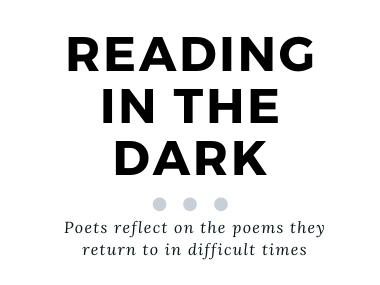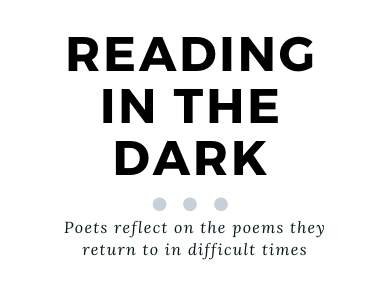Poems from The Tale of Genji
Reading in the Dark
Kimiko Hahn on poems from The Tale of Genji

I sigh at its name, though I have not seen Musashi.
I sigh as if they were mine, those lavender grasses.
— Anonymous, Kokin Rokujō, Zoku Kokka Taikan 34353
These mountain cherries with no one to look upon them:
Might they not bloom when all the others have fallen?
—Ise, Kokin Wakashū 68
Is there no way to make the past the present,
To wind and unwind it like a ball of yarn?
—Tale of Ise 32
I wonder if even in jest I could do without you.
I gave it a try, to which I proved unequal.
— Anonymous, Kokin Wakashū 1025
If you have hearts, O cherries of Fukakusa,
This year alone send forth your flowers in black.
— Kanzuke Mineo, Kokin Wakashū 832
Translated by Edward Seidensticker
In response to the Coronavirus pandemic, we asked poets to write about the poems they return to in difficult times—to find solace, perspective, or even a moment of delight. Subscribe to the PSA newsletter for more Reading In The Dark responses and to keep updated with the PSA.
I feel a sudden twinge. A despondency that brings to mind a certain Slant of light. Whether I stop to think of the poem or just continue with the task at hand, such a phrase is merely a current in my drift of thought. As if the words were my words. And this Emily Dickinson line is my own in the sense that it wafts in and out. Like phrases and lines by other writers . . . I shall wear the bottoms of my trousers rolled . . . And they, since they / were not the one dead . . . What lips . . .
This drift is how I imagine poetry circulated for eleventh-century Japanese. When reading The Tale of Genji, I love how alive poetry was at any moment of the day. Indeed, it was de rigueur to compose poems, exchange them, recall a phrase or refer to a classic from an imperial anthology (and recognize such an allusion). A poem between two potential lovers might be the only "meeting" before an actual tryst. A great deal depended on those thirty-one syllables. With this in mind, I return to the classic written by Murasaki Shikibu (Edward Seidensticker translation), to flip through and read in the footnotes the poems that occur to the characters just as a certain Slant of light occurs to me.
I find an anonymous one (Number 506) from the Kokin Wakashū compiled in 905. At the moment, to read a poem on love that is discouraged by a barrier (real and figurative), is to experience the poem differently than a few weeks ago. I am saddened that I cannot visit certain family members.
I linger here beside your fence of rushes,
So near, and why is there no chance of meeting?
—Kimiko Hahn
Kimiko Hahn is the author of ten books of poems including, Foreign Bodies, Brain Fever, and Toxic Flora. She has taught in graduate programs at the University of Houston and New York University, and is a distinguished professor in the MFA Program in Creative Writing & Literary Translation at Queens College, The City University of New York.

